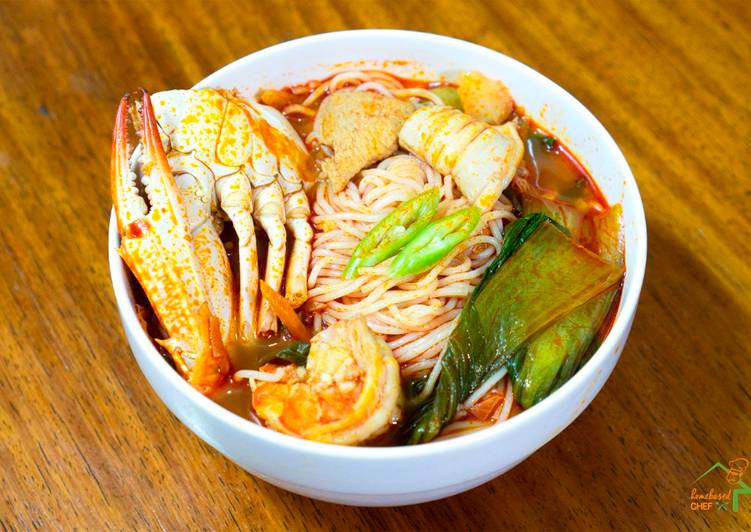Jjampong (Korean Spicy Seafood Noodle Soup). Jjamppong / Jjampong (짬뽕) is a popular Korean spicy noodle soup that is loaded with various type of seafood. It tastes very refreshing and comforting! Every now and then I have a craving for Jjamppong (Korean spicy seafood noodle soup).
 It's loaded with pork, seafood and vegetables!
Korean-Chinese cuisine was developed by early Chinese immigrants in Korea, and has become a huge part of Korean food culture.
Jjamppong (짬뽕) is a Korean noodle soup with red, spicy seafood- or pork-based broth flavored with gochugaru (chili powder).
You can cook Jjampong (Korean Spicy Seafood Noodle Soup) using 21 ingredients and 7 steps. Here is how you cook that.
It's loaded with pork, seafood and vegetables!
Korean-Chinese cuisine was developed by early Chinese immigrants in Korea, and has become a huge part of Korean food culture.
Jjamppong (짬뽕) is a Korean noodle soup with red, spicy seafood- or pork-based broth flavored with gochugaru (chili powder).
You can cook Jjampong (Korean Spicy Seafood Noodle Soup) using 21 ingredients and 7 steps. Here is how you cook that.
Ingredients of Jjampong (Korean Spicy Seafood Noodle Soup)
- You need 1 bunch of Bokchoy.
- It's 120 grams of Chicken Breast.
- It's 6 cloves of Garlic.
- It's 1 inch of Ginger.
- It's 4 stalks of Onion Leeks.
- You need 1/4 head of Cabbage.
- Prepare 1 piece of White Onion.
- It's 1/2 piece of Carrot.
- It's 1/2 piece of Zucchini.
- You need 4 tablespoons of Cooking Oil.
- It's 4 tablespoons of Gochugaru.
- Prepare 2 tablespoons of Soy Sauce.
- You need 2 teaspoons of Oyster Sauce.
- It's 6 cups of Water.
- You need 1/4 cup of Cooking Wine.
- You need 1 teaspoon of Sesame Oil.
- Prepare 2 pieces of Squid.
- Prepare 2 pieces of Prawns.
- You need 1 piece of Crab.
- You need 2 bundles of Somen Noodles.
- Prepare of Water for boiling.
Common ingredients include onions, garlic, Korean zucchini, carrots, cabbages, squid, mussels, and pork. Beef, bok choy, cabbage, carrot, clams, dried anchovies, dried kelp, fish sauce, garlic, ginger, hot pepper flakes, jjajangmyeon noodles, large green onion, leek, mussels, onion, pork, salt, sesame oil, shrimp, squid, vegetable oil. Jjamppong is a spicy Korean noodle soup with seafood in a spicy broth. It's a Korean-Chinese dish with its origin in China.
Jjampong (Korean Spicy Seafood Noodle Soup) instructions
- PREPARE THE CHICKEN AND THE VEGETABLES Slice the chicken breast thinly. Chop the garlic and ginger finely. Chop the onion leeks thinly or cut it into strips. Slice the white onion and the cabbage. Cut the root end of the bokchoy and wash well to remove the dirt. Julienne-cut the carrot and zucchini. To do the julienne-cut: slice the vegetable diagonally into long sticks then into strips..
- PREPARE THE SEAFOOD For the crab, remove the cover and the gills then cut the meaty side into two. For the prawns, remove the head and shellthen de-vein the prawns by making an incision on its back. For the squid, remove the head including the ink sac and innards. Peel the skin and cut it vertically on one side to make it flat. Then make a criss-cross incisions on the front and back sides. Wash the seafood under running water..
- COOKING INSTRUCTIONS Under low heat, heat the wok or large skillet and add 4 tablespoons of cooking oil. Add the garlic, ginger, onion leeks and let them infuse their flavors into the oil. Turn up the heat to high. Add the chicken and vegetables (except for the bokchoy) then stir fry until the chicken turns white..
- Add the gochugaru and stir fry for a minute. Add 2 tablespoons of soy sauce around the wok or skillet (not directly to the vegetables) and 2 teaspoons of oyster sauce. Continue to stir fry for 30 seconds. Pour 6 cups of water and 1/4 cup of cooking wine. Bring to boil and boil for 5 minutes..
- While the soup base is boiling, cook the somen noodles according to package instructions. Somen noodles are thin and will take just a few minutes to cook when placed in boiling water. Boil the noodles, drain, and rinse under cold water. You may also soak it in ice water to stop cooking and then drain later before adding to the jjampong soup..
- Add the crab into the soup and boil for 5-10 minutes depending on how big the crab is. When the crab is already cooked, add the squid, prawns, bokchoy, and sesame oil. You can adjust the seasoning if needed, according to your preference. Continue boiling until the squid and shrimp is cooked completely (about 5-8 minutes)..
- PLATING Add the noodles neatly into the center of the bowl. Pour the soup and arrange the seafood around the noodles. Top with chili and onion leeks. Serve hot..
Called 炒码面 (chaomamian) in Chinese, this dish originated from Hunan and traditionally made with a white color bone broth. The Chinese restaurants in Korea started to adapt. There are two majorly popular Chinese inspired Korean foods. One is the Jjajangmyun and the other is this Korean spicy seafood noodle soup, Jjamppong (짬뽕). If you go to any Korean-Chinese restaurants, you will find these two items on the menu for sure.